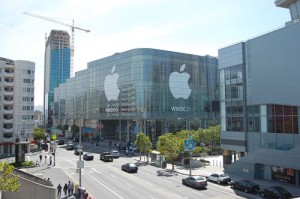Apple’s Worldwide Developers Conference (WWDC)
All eyes are on Apple Worldwide Developer Conference (WWDC) in San Francisco on Monday and whether Steve Jobs will unveil Apple iPhone 5. Most observers say Apple will not unveil the next generation iPhone though launch of the new power-packed iOS 5 is on the cards. A minority of analysts believe Apple will surprise everyone by revealing the iPhone 5.
However, a silent onslaught on iOS and iPhone is brewing in the Android world. A slew of Android devices slated to hit market are 4G-enabled, NFC capable, with some having ultra-high resolution cameras.
The endearing Android line-up has already caused apprehension in the iOS camp. Here is a quick glance at what is cooking in the Android camp -
T-Mobile is blazing the summer Android launch trail by announcing the HTC Sensation 4G, Samsung Gravity Smart and Samsung Exhibit 4G in quick succession. while HTC Sensation 4G will be released on June 15, the other two hand sets will also come sometime this month.
Sprint has lined up three handsets, HTC Evo 3D, the Motorola XPRT, and the Motorola Titanium. While the XPRT will arrive on June 5, the other two are likely to come in the near future.
AT&T was up to speed by the announcement of Android-based Pantech phone Crossover. To be available on June 5, it will come at 69.99 dollars with a two-year agreement.
Though Verizon appears not to have any earthshaking smart phone announcement to make, it has showcased 4G LTE version of the Galaxy Tab 10.1.
And then there is talk about HTC Evo 3D. Leaks suggest HTC is mulling the release of the new Android phone on AT&T and T-Mobile.
As someone who served on the boards of Siri and Nuance—two companies whose technologies are rumored to be deeply integrated into Apple’s upcoming iOS 5—I might have a unique take on what’s possible at the upcoming Apple World Wide Developer Conference (WWDC) in San Francisco June 6-10. I throw my speculations into the ring with so many others, informed not by any privileged knowledge – the product team is appropriately tight-lipped, but by my long-time involvement with speech recognition and artificial intelligence (AI). With Siri and Nuance, Apple can leapfrog Google’s Android in the short-term. Or, they can do something ‘Apple-esque’ and fundamentally change the rules of the game and reclaim leadership for good.
From a standing start three years ago, Android has managed to overtake iOS as the leading smartphone platform. Today, Google has 35 percent (versus Apple’s 26 percent) of the U.S. smartphone market, according to a comScore report for April 2011. How Apple uses Siri and Nuance in their next move will have important repercussions for the company as well as the developer, technology, and user communities worldwide.
Of all the rumors coming out of the rumor mill, the following is most pertinent for this conversation – It is widely reported that Apple is working on a licensing agreement with Nuance to embed speech recognition capabilities deeply into iOS 5. It is also speculated that Siri, a natural language AI technology acquired by Apple in April 2010, will figure prominently in iOS 5. In addition, Apple may be working on a ‘world phone’ or ‘iPhone 4S or 5′ which would be compatible with both GSM and CDMA—which means it would work on almost all of the world’s cellular networks.
Happy June! Apple’s Worldwide Developers Conference is a big developer conference from June 6-10 this year and will preview the future of iOS and Mac OSX.
With ten years of retail service, Apple has changed how companies do business. It began with a full size mockup that was built in a warehouse. Gateway retail stores faced problems in the early 2000′s with poor customer service and out-of-the-way locations.
It was a financial failure from the start since many other retailers sold Gateway TV’s and other gadgets that competed with their own stores. The first Gateway store opened in 1996 and at the peak they had over 300 stores. With a physical storefront, Gateway had to apply sales tax to its online store. Gateway lasted for eight years and Apple now has well over 300 stores and is now over ten years old.
The Genius Bar originally did not require you to have an appointment to get your new gadget serviced. Theaters that were in most of old larger stores were used to show product demonstrations or for other special events. Now that floor space is given to the Genius Bar and Creative training tables.
Original stores had dedicated cash registers around the store and were phased out as Apple introduced EasyPay to accept credit card transactions. The EasyPay devices migrated from Windows CE applications running on Symbol hardware to an iPod touch outfitted with a card reader and barcode scanner.
Receipt printers were installed under tables so the staff could stay with the customer longer. Now the product can be delivered from the back room so the customer can continue to ask questions or receive help.
